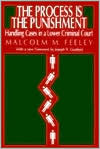How true that statement is, well sometimes. In a recent meeting, I sat by Wendy Gaustaferro from the Criminal Justice department.  She was preparing to teach a class ideas presented in Feeley’s 1979 “The process is the punishment“, which describes the lower criminal courts of new haven Connecticut. After months of observing the Court of Common Pleas, Feeley writes:
She was preparing to teach a class ideas presented in Feeley’s 1979 “The process is the punishment“, which describes the lower criminal courts of new haven Connecticut. After months of observing the Court of Common Pleas, Feeley writes:
“Jammed every morning with a new mass of arrestees who have been picked up the night before, lower courts rapidly process what the police consider to be ‘routine’ problems – barroom brawls, neighborhood squabbles, domestic disputes, welfare cheating, shoplifting, drug possession, and prostitution – not ‘real’ crimes. These courts are chaotic and confusing; officials communicate in a verbal shorthand wholly unintelligble to accused and accuser alike, and they seem to make arbitrary decision, sending one person to jail and freeing the next.”
As I understand it, the basic idea of the book is that having to go through the court process is punishment in itself. Apart from the courts there are plenty of punishing processes. DMVs, Departments of Watershed Management Offices, all conjure an image of punishing lines and archaic forms. Within the enterprise, it is often these punishing processes which lead many to take the easiest but less efficient route. All the more reason for Business Process Management and Improvement.

Hm. Apparently even courts need user testing . . . Interesting, interesting . . . 🙂